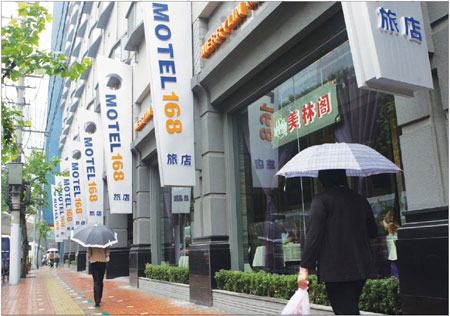Accor looks at China's budget hotels
Updated: 2011-03-18 10:23
By Shi Yingying (China Daily European Weekly)
Morgan Stanley plans sale of its 59% holdings in Motel 168 chain
Europe's largest hotel operator Accor is keen to bid for a controlling stake in a Shanghai-based company that operates 276 budget hotels in more than 70 cities around China.
US investment bank Morgan Stanley has said it intends to sell its 59 percent holdings in Motel 168 - the fifth largest budget hotel chain in China - for a reported price of up to $1 billion (715 million euros).
 |
|
Morgan Stanley plans to sell its 59 percent stake in Motel 168, |
In 2006, Morgan Stanley bought 20 percent of the Motel 168 chain for $20 million and over the next few years increased its holdings to 59 percent. It hasn't said why it wants to sell them now.
But its offer is expected to kick off a keen bidding contest between hotel chain operators in a rush to establish their presence in China's budget hotel segment at a time when luxury hotels, especially in the major cities, are experiencing a room glut.
Hospitality experts say Morgan Stanley has picked the right time to sell because the wait for Motel 168 to obtain a listing on the depressed stock market can be long.
Several domestic hotel chain owners - including China's top four hoteliers Home Inn, Jin Jiang Inn, Hanting Inn and 7 Days Inn - have expressed interest in the bidding for Morgan Stanley's stake.
Adeline Phua, associate director of HVS Global Hospitality Services, says buying Motel 168 would be the quickest way for the French hotel group to increase its market share in China's budget hotel segment.
Accor, the fourth largest hotel group globally after InterContinental, Marriott and Starwood Hotels, established its lower-end brand Ibis in China with the opening of its first property in Tianjin in 2004.
But its budget hotel business in China has grown slower than expected. Only 52 Ibis hotels have been opened since then, just a little more than half of the company's original plan.
Zhao Huanyan, a professor at the Shanghai Academy of Social Sciences, says that foreign hotel operators have been outperformed by their domestic counterparts in both network and recognition.
"China's local budget hotel operators have never been hungrier than in the past 10 years," Zhao says.
"The top three (domestic players) created sales amounting to 40 percent of the sector's total."
Foreign hoteliers hold only less than 5 percent of China's budget hotel share.
Lily Ng, vice-president of sales and marketing at Jones Lang LaSalle Hotels, says top international hotel groups are not key players in China's budget hotel market.
One reason is that international chains usually charge higher than local ones, thus keeping away price-sensitive clients.
Ibis' new property in Shanghai's Xujiahui, which will open in April, is asking for 299 yuan a night; average charges at the 7 Days Inn hotels nationwide is 170 yuan and at Home Inn, 190 yuan.
Tina Cao, a 25-year-old sales executive of Hong Kong's media firm TOM Group Ltd's Shanghai branch, says her company cut costs on business travel after the global credit crisis in 2008 and she has had to downgrade to cheaper budget hotels from three- to four-star ones.
"I have to travel more these days to drum up business but the travel budget is shrinking to cut cost," says Cao, who travels frequently between Hong Kong, Beijing and Shanghai.
"Tourists (for budget hotel) are demanding lower and lower rates from motels and there is no brand loyalty left in this business. Customers will go to the ones offering the best deal in town."
Ng says local budget hotels have better cost control on their properties.
For example, Ibis invested 30 million yuan (3.26 million euros) at its first hotel in Tianjin in 2004, which means each of its 157 guestroom cost more than 200,000 yuan.
Local hoteliers usually spend less than a tenth of this amount on each room.
Last month, Reuters reported that Accor had held talks with private equity funds about forming a bidding consortium for the asset. It also mentioned potential private equity partners for Accor included Blackstone Group and Carlyle Group.
Around that time, Accor expressed its intention to speed up its expansion in emerging markets such as China, while stepping up the development in mature European markets.
"We want to turn Accor into a global leader in franchises, notably in Europe, and our objective will be to accelerate the execution of our strategy," Accor's new chairman and chief executive Denis Hennequin said last month.
E-paper

City of Joy
Welcome to the 'world of smiles' where life meanders slowly.
Debate on nuclear power revived
The future is now
Common approach
Specials

Earthquake Hits Japan
A massive 8.8 magnitude quake hit the northeast coast of Japan on March 11,2011.

NPC & CPPCC sessions
Lawmakers and political advisers gather in Beijing to discuss major issues.

Slide: Japan quake
Devastating earthquake and tsunami left millions without water, electricity, homes or heat.
